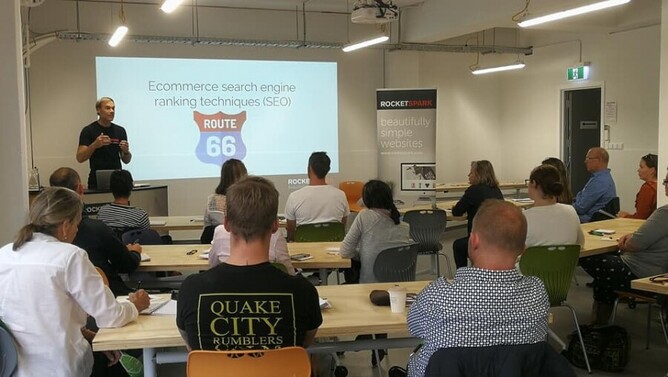Grant was supported by premier Google Partners from Harper Digital to present specifically on paid digtial advertising options. Here, we’ve summarised the best bits from the workshop.
What’s in a website?
It’s really important that you make a great first impression with your website because that impression will last. Your homepage should be like a tasting platter to lead people deeper into your website - with previews to products, blogs, and listed categories. Remember that you want your customers to travel around your website in a particular way. Give them clear directions on their way - imagine what your website journey would look like without needing to use the website’s menu.
The technical bits ...
The platform you use to host your website is really important. It needs to:
- Load quickly
- Use HTTPS - be secure
- Be mobile-friendly
- Be easy to update (Google optimises websites with fresher content)
But how will people find you?
You can have the flashest website ever and it won’t do its job if no-one can find it. This is where Search Engine Optimisation (SEO) comes in.
SEO, put simply, is how your website is ranked when someone Googles (or searches) for something you do. It’s really important that your site show up on the first page of results as barely anyone goes past that first page.
So how can you ensure your site is optimised?
There are many elements that go into making a website rank well and it's important to make sure you are making the most of each opportunity to include the relevant keywords on a page.
Pick a key word theme per page. Don’t try to do everything on a single page.
Include keywords in your headings, text, links, and product categories.
If selling branded products be sure to include the brand.
Do I need to blog, too?
Blogs are a really great way to keep your content fresh, to help with optimisation.
Good blogs answer questions that customers have, rather than simply promoting the product.
Make sure your blog posts are about more than just what you’re selling.
Writing about other related topics can help establish you as an expert in your field, which will also build trust with your audience.
Use the tools available.
There are some great tools available to help you make the most of your ecommerce site.
These include:
- Google analytics
- Google Keyword planner
- Google expert partners
- Google Search console
Increase your exposure...
And we don’t mean bare skin!
Combine Google shopping and Google ads for increased brand exposure. When a consumer is faced with both shopping and text ads …
90% visit a website
83% make a purchase
Those are the kind of numbers you want!
And what about social media?
Social media is another great way to increase your optimisation, particularly if you use plugins to show your social media feed on your website. But there are some key things to remember.
People don’t consciously use social media to shop, so don’t treat it like an extension of your website. Use it to build community around your brand.
Also, make sure you:
Break up your content; don’t just promote your product or service.
Focus on your strengths. Don’t spread yourself too thin by using every social media platform. If a particular platform does not suit your product or is not used by your target market, don’t use it. You’re better to do one or two really well than try and do them all.
Keen to learn more?
If you couldn’t make the workshop and are keen to learn more Rocketspark have additional resources for you:
View recordings of Rocketspark’s online classes
Download Rocketspark’s free e-book Getting Started with ecommerce







